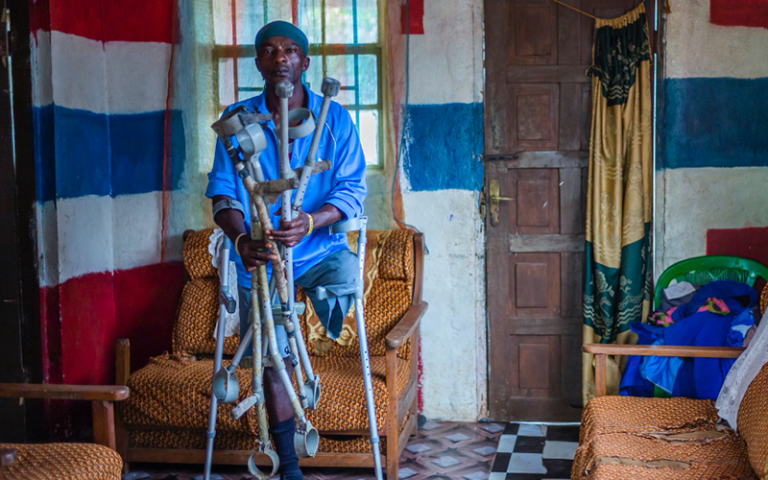Reports from AT2030: Community led solutions launched
11 November 2020
The AT2030 research project, led by Julian Walker, has launched two new reports on behalf of the Global Disability Hub, to provide evidence on the role of informal markets in the access to assistive technologies in Sierra Leone and Indonesia.

It is estimated that by 2050 two billion people would benefit from Assistive Technology[1] (AT) yet 90% will not have access. Furthermore, most of the people that need AT live in low-income countries, with a large proportion in informal settlements and slum communities. As such, DPU’s involvement in AT2030, led by the Global Disability Innovation Hub, focuses on how disabled and older people in informal settlements are able to achieve their aspirations, and the role that Assistive Technologies play in their strategies to do so.
As part of this project, the Informal Markets Study[2], led by Julian Walker, supplemented the AT Country Capacity Assessments being piloted by the Clinton Health Access Initiative (CHAI), using the WHO (World Health Organization) ATA-C (Assistive Technology Assessment - Capacity) tool, developed with the support of the GDI Hub. The ATA-C tool is designed to assess the capacity within countries to make the most effective, high-quality AT (Assistive Technology) available at affordable yet sustainable prices. The focus of the Informal Markets Study was to extend this research to understand existing practices of AT provision through informal markets and social institutions, and the experiences of AT users on low incomes living in a context of informality.
Some of the key findings of the Informal Markets Study were that:
- Informal Markets play a key role in providing AT to low-income residents, particularly for those with some functional difficulties. 65.3% of respondents in the 2 AT2030 case study communities in Banjarmasin, Indonesia acquired their products on the informal market, followed by formal private sector businesses (see diagram). This data was gathered through the Rapid Assessment of Assistive Technology household survey led by Ignacia Ossul and conducted with 4,000 people across 4 informal settlements in Freetown and Banjarmasin. This data demonstrates the importance of the informal sector as an Assistive Product (AP) distributor in the surveyed settlements, and in particular for glasses and spectacles, which were by far the most commonly accessed AP in these communities.
- Informal AT enterprises in Indonesia, and in particular those led by AT users, make important contributions to the development and delivery of low-cost AT. They also contribute innovations in product development to make APs that are more suitable and attractive for users, notably, in many cases AP produced by informal enterprises were regarded by users as better quality than AP accessed through formal channels
- Informal AP providers in Sierra Leone—including NGOs, DPOs, and religious organisations—play a key role in providing basic AT. These are formal institutions insofar as most are legally registered as CSOs, but they are informal AT providers since they do not conform with regulations for registering with medical bodies or professional qualifications for staff. In addition, they do not meet minimum AT standards, which is also the case for the formal AT sector in Sierra Leone. Other key informal AT providers are large, usually imported second-hand goods traders and tradespeople such as carpenters and motor mechanics who produce and repair basic assistive products (APs).
On the other hand, relying on informal providers has a range of disadvantages for those in need of AT. These include informal providers’ inability to produce, prescribe, or fit more complex APs, such as hearing aids or prostheses, some issues with the quality of AP, inconsistent supply, and the lack of associated services including training on use.
Building on this analysis the reports make a range of recommendations focused on the improving the strategic coordination of formal and informal AT sectors, related to regulation arrangements, incentives and knowledge and information sharing.
The full reports are available on the dedicated project research page.
Image: Mr B is the captain of the Sierra Leone amputee football team, which was founded in 1996 and is registered as a Disabled People Organisation. In order to play, he adapts his crutches, stitching the elbow grip shut with metal wiring so that the crutches do not fall off when he raises his arms to jump or kick (part of the interview for the Informal Markets Study). Photo credit: Angus Stewart
[1] The World Health defines assistive technologies (AT) as the “the umbrella term covering the systems and services related to the delivery of assistive products and services”, which are products that “maintain or improve an individual’s functioning and independence, thereby promoting their well-being”. Examples of Assistive Products (AP) can be hearing aids, wheelchairs, communication aids, spectacles, prostheses, pill organizers and memory aids.
[2] The Sierra Leone study was undertaken by Julian Walker, Nada Sallam, and Ignacia Ossul (Development Planning Unit, University College London, DPU-UCL), Samuel Sesay and Ibrahim Gandi, (CODOHSAPA), Hawanatu Bangura (SLURC), and a
facilitation team from FEDURP (the Sierra Leone Federation of the Urban and Rural Poor). While the Indonesian study was undertaken by Julian Walker (Development Planning Unit, University College London), Ahmad Rifai, Fuad Jamil, Vindi Kurniawan, and Nina Asterina (Yayasan Kota Kita) and Fitria Ramadhini (Kaki Kota) on behalf
of the Global Disability Innovation Hub. Analysis of the rATA survey was undertaken by Mark Carew of Leonard Cheshire.
 Close
Close

